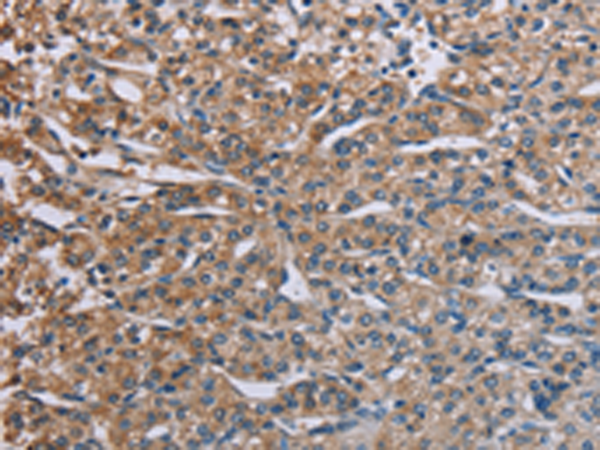

| WB | 咨询技术 | Human,Mouse,Rat |
| IF | 咨询技术 | Human,Mouse,Rat |
| IHC | 1/25-1/100 | Human,Mouse,Rat |
| ICC | 技术咨询 | Human,Mouse,Rat |
| FCM | 咨询技术 | Human,Mouse,Rat |
| Elisa | 1/1000-1/2000 | Human,Mouse,Rat |
| Aliases | PLEXD1 |
| WB Predicted band size | 212 kDa |
| Host/Isotype | Rabbit IgG |
| Antibody Type | Primary antibody |
| Storage | Store at 4°C short term. Aliquot and store at -20°C long term. Avoid freeze/thaw cycles. |
| Species Reactivity | Human, Mouse |
| Immunogen | Synthetic peptide of human PLXND1 |
| Formulation | Purified antibody in PBS with 0.05% sodium azide and 50% glycerol. |
+ +
以下是关于PLXND1抗体的3篇参考文献及其摘要概述:
1. **"Targeting PlexinD1 in tumor-associated angiogenesis using a humanized monoclonal antibody"**
- **作者**: Ferrara N 等
- **摘要**: 该研究开发了一种人源化抗PLXND1单克隆抗体,通过阻断其与配体Sema3E的相互作用,抑制肿瘤血管生成。抗体经流式细胞术和免疫组化验证,可特异性结合内皮细胞PLXND1.并在小鼠模型中减少肿瘤生长。
2. **"Characterization of a novel anti-PlexinD1 antibody for functional studies in vascular development"**
- **作者**: Torres-Vázquez J 等
- **摘要**: 研究报道了一种高特异性兔源多克隆抗体的生成,用于斑马鱼和小鼠模型中PLXND1的定位分析。抗体经Western blot和免疫荧光验证,揭示PLXND1在胚胎血管分支形成中的动态表达模式。
3. **"PLXND1 as a biomarker in glioblastoma: immunohistochemical analysis with a validated antibody"**
- **作者**: Wang L 等
- **摘要**: 通过商业化抗PLXND1抗体(货号AB123.公司X)对胶质母细胞瘤组织进行免疫组化分析,证实PLXND1在肿瘤血管内皮细胞中高表达,且与患者生存期缩短显著相关,支持其作为治疗靶点的潜力。
4. **"A monoclonal antibody against plexin D1 inhibits tumor cell migration in vitro"**
- **作者**: Kim M 等
- **摘要**: 该研究利用自研的小鼠抗PLXND1单克隆抗体(克隆号PLX-D1-Mab7),在体外实验中阻断PLXND1信号通路,显著抑制黑色素瘤细胞的迁移能力,提示其在抗转移治疗中的应用前景。
这些文献涵盖抗体的开发、验证及在肿瘤血管研究中的应用,符合实验工具类参考需求。
The PLXND1 antibody targets Plexin-D1. a transmembrane receptor belonging to the plexin family, which plays critical roles in cell signaling and guidance during development. Plexin-D1 (encoded by the *PLXND1* gene) interacts with semaphorins, particularly class 3 semaphorins (SEMA3s), to regulate cellular processes such as angiogenesis, axon guidance, and immune cell migration. It is highly expressed in endothelial cells, where it governs vascular patterning by modulating cytoskeletal dynamics and cell adhesion. Dysregulation of PLXND1 has been implicated in pathological conditions, including cancer, atherosclerosis, and retinopathies, due to its role in promoting abnormal blood vessel growth or inflammation.
PLXND1 antibodies are essential tools for studying its expression, localization, and function in physiological and disease contexts. They are widely used in techniques like immunohistochemistry, Western blotting, and flow cytometry to assess protein levels in tissues or cultured cells. Researchers also employ these antibodies to investigate PLXND1's involvement in tumor angiogenesis, where its overexpression correlates with metastatic progression, or in cardiovascular diseases linked to endothelial dysfunction. Additionally, PLXND1-blocking antibodies are explored therapeutically to inhibit pathological vascular remodeling. Validation of antibody specificity, often via knockout controls or peptide competition assays, is crucial due to potential cross-reactivity with other plexin family members.
×